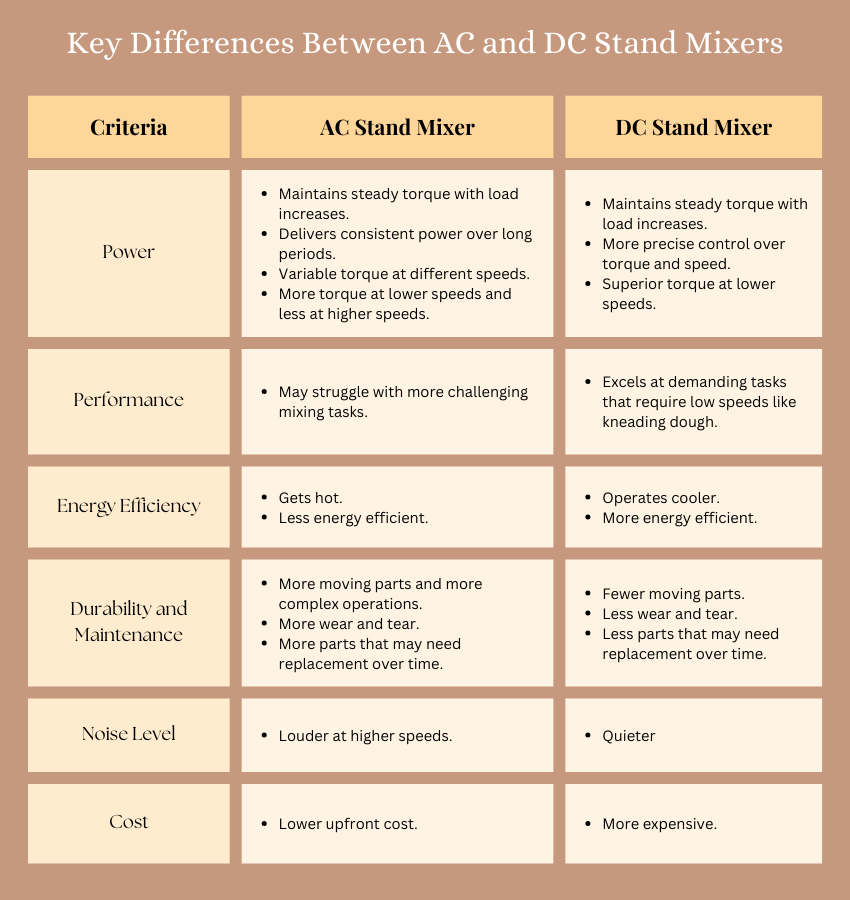Notice: I receive compensation if you buy something through affiliate links on this post. This does not change the price you would pay.

You’re looking at kitchen mixers. As if the list of criteria you have to decipher was not enough, here is another one: AC vs. DC stand mixers.
What the heck is this head-scratching jargon?
You’re not going to thread into the science of motors. No way.
Why should you care about the distinctions between AC and DC motors in mixers?
Will it change how a stand mixer performs? Will it impact what and how you bake?
You’re left thinking that it gets even more complicated.
Hold on, I’m here to tell you it’s less thorny than you think.
And, no, you don’t have to venture into convoluted science at all.
In this detailed guide, you’ll learn how AC and DC motor mixers affect your mixing, baking, and cooking and why you should care.
It’ll explain techie terms, pros, cons, and everything in between so you can make an informed choice without the headache.
Whether you’re a casual cook or a baking enthusiast, you must grasp the distinctions between these mixers to pick the ideal tool for your culinary endeavors.
Let’s cut through the jargon and get to what matters—making your time in the kitchen more productive and enjoyable.
Contents
AC vs DC Stand Mixers (Why It’s Not A Showdown)
Consumer stand mixers have long used AC motors, but DC motors are slowly eroding that exclusivity.
Consequently, there now seems to be a mixer battle in our minds.
But there is none because there is one type that matches your situation.
However, you must thoroughly understand these mixer types before parting with your money.
I have an engineer-husband who is my number one go-to resource for home appliances.
We had several conversations about this subject. I made a few runs of dough in my KitchenAid Pro 600 series, which has an AC motor. Then, we went to a friend’s bakery to witness his commercial mixer (with a DC motor) do the job.
Hubby does not need to see those mixers in action to give me answers, but I wanted to see his explanation in action.
What did I learn? Drum roll…
What is AC (Alternating Current)?
AC power flows through the walls of your home, powering your lights, your fridge, and everything else that runs on electricity.
It alternates direction, changing how it flows many times per second.
AC power is efficient for long-distance transmission, which is why it’s the standard for the grid.
Now, an AC motor is low-cost. It requires lower power on start and is widely used in applications that require:
- controlled acceleration
- variable speed
- adjustable torque
The motor derives power supply from the mains and generates varying voltage. As such, the energy that flows into it is not consistent.
Stand mixers with AC motors have historically dominated the market because they’re more affordable and familiar.
What is DC (Direct Current)?
Unlike AC, DC power flows in one direction, providing a steady, consistent output.
A DC motor obtains energy from batteries or cells like your phone charger.
It produces consistent voltage, thereby supplying a steady flow of energy, which makes it suitable for operations requiring excellent speed and torque control.
A DC motor generates the same mechanical power as a comparable AC motor but with lesser power consumption.
However, it requires more starting power.
DC motors are a newer, more refined approach to kitchen mixers. Thanks to technological advancements, these motors have slowly become part of modern kitchen appliances.
Imagine DC mixers as the sleek, modern sports car of the mixer world—smooth, efficient, and powerful, especially at lower speeds.
Now, let’s tackle an important feature to consider: torque.
What Is Torque?
Torque is usually mentioned when evaluating stand mixers but is often a murky criterion. It is not measured. Descriptions usually just say “great torque” and similar adjectives.
That’s to be expected because you can only ever gauge a stand mixer’s torque when you use it.
Before we go any further…
What is torque anyway?
It is the rotational force that moves objects around.
Imagine turning a stubborn doorknob that’s stiff and hard to twist. Torque is the force that helps you turn that knob smoothly without straining or slipping.
In baking, torque plays a vital role in kneading stiff dough. It has to be sufficient to pound and turn the dough around without stalling or giving up.
How AC and DC Stand Mixers Differ

Let’s discuss the differences between DC and AC mixers outlined in the Table above.
1. Power and Performance
Let’s talk about power.
How well do AC stand mixers perform?
Read on to find out…
Steady Torque with Load Changes: AC stand mixers maintain steady torque, even when the load increases, like when the mixture thickens or more ingredients are added.
Power Delivery: AC motors are reliable and can deliver consistent power over long periods. However, their torque performance at different speeds can vary, usually providing more torque at lower speeds and less at higher speeds.
Here’s where DC mixers shine.
High Torque at All Speeds: DC stand mixers perform consistently with varying loads by dynamically adjusting their torque.
They deliver power more efficiently, particularly at low speeds, which is vital when working with tougher mixtures like dough.
Have you ever tried to knead a heavy dough with an AC mixer? It can struggle. On the other hand, a DC mixer powers through it like a champ because of its superior torque at lower speeds. It’s like a standard car and one with a turbo engine—both will get you there, but the DC mixer does it with more finesse.
Efficient and Precise: DC mixers are excellent for various mixing tasks (from whipping to kneading) because they offer more precise control over torque and speed. They maintain steady torque even when the load changes because they efficiently convert electrical energy into mechanical power.
Both AC and DC stand mixers maintain steady torque as the load increases. However, DC motors have better low-speed torque and more precise control.
Both types can handle challenging tasks. But, DC motors excel in applications where fine control and consistent torque at low speeds are essential.
2. Energy Efficiency
While powerful, AC mixers get hotter, equating to energy loss and higher power bills. You might not notice it immediately, but it adds up over time.
DC mixers are more energy-efficient because they operate cooler. They transform more electrical energy into mechanical power, resulting in less energy loss and reduced power bills in the long run.
Those energy savings can be significant if you use your mixer frequently. It’s like choosing between a gas-guzzler and a hybrid car. Sure, the hybrid might cost more upfront, but it’ll save you money on fuel over time.
3. Durability and Maintenance
Many AC mixers are known for their longevity. However, because they have more moving parts and complex operations, they tend to undergo more wear and tear. Over time, you might deal with maintenance issues or need to replace parts.
DC mixers are more robust, require less maintenance, and have less wear and tear because they have fewer moving parts. Imagine the difference between an old mechanical watch and a modern digital one—the former might need more frequent tuning while the latter keeps ticking.
4. Noise Levels
AC mixers can be louder at higher speeds. While not deafening, the motor hum can become an annoyance if you’re sensitive to noise or often bake while others are around.
In contrast, DC stand mixers are quieter because of a smoother power delivery, making for a more pleasant kitchen experience. It’s the difference between a noisy city street and a quiet country road—one gets the job done, but the other does it with much more peace and calm.
Cost Considerations
Initial Purchase Price
Let’s face it—price is a significant factor for most of us.
AC mixers are more appealing to those on a tight budget because they are usually cheaper. They’re widely available and often reasonably priced in most stores.
DC mixers cost more upfront. This higher price might make you hesitate, but the technology in DC motors is more advanced, which adds to the cost. It’s like paying more for organic produce—you’re investing in quality and sustainability.

Long-Term Costs
While AC mixers might be cheaper, higher energy bills, potential maintenance, and replacement parts can all add up.
Though pricier at the outset, DC mixers are more cost-efficient over time. They use less energy, require fewer repairs, and generally last longer. If you’re in it for the long haul, that initial investment could save you money. It’s a case of pay now or pay later.
User Experience and Feedback
User Preferences
User preferences are mixed. Some people swear by their AC stand mixers, citing their reliability and time-tested performance. Switching to something different can feel unnecessary for these users, especially if their trusty mixer has always been there for them.
But there’s a growing crowd of DC mixer fans who wouldn’t return to AC. They love the quiet operation, the power at low speeds, and the energy efficiency. The higher price is well worth it for these users because their mixers meet all their needs.
Real-World Reviews
AC mixers get high marks for being dependable and affordable. However, some users note that they can struggle with more challenging tasks or they have had to deal with more repairs over time.
DC mixers, meanwhile, are often praised for their performance, especially with dense doughs or lengthy mixing sessions. Their quiet operation and energy efficiency are also common points of praise. But, their higher cost is frequently mentioned as a potential drawback.
It’s a balancing act—what’s more important to you?
AC vs. DC Stand Mixer: Choosing Your Match
Why Pick An AC Mixer?
An AC mixer might be the best option if you’re tight on budget.
They’re great for occasional bakers or those who don’t need a mixer for heavy-duty tasks.
If you bake a few times a year and don’t want to spend a fortune, it will get the job done without breaking the bank.
Scenarios Where DC Mixers are the Better Choice
A DC stand mixer could be a better investment if you use it frequently. Its efficiency, power, and durability make it ideal for those who bake often or work with challenging recipes.
If you’re looking for something that will last and offer top-notch performance every time, the DC mixer is like a luxury car: it offers comfort, power, and durability.
KitchenAid AC vs. DC Stand Mixers: Which One is Right for You?
KitchenAid stand mixers are known for their durability and iconic design. But did you know that KitchenAid offers both AC and DC models?
Let’s break down the key differences.
Power and Versatility
KitchenAid’s AC mixers have been around for decades and offer reliable performance for everyday tasks.
They are great for general use, whether you’re preparing a quick batch of cookies or kneading bread dough.
Whereas The 7-quart bowl-lift can handle dense mixtures or extended mixing times, the Classic and Artisan can struggle.
| KitchenAid Classic | KitchenAid Artisan | KitchenAid 7-quart Bowl-Lift | |
|---|---|---|---|
 |  |  | |
| Power | 275 Watts | 325 Watts | 500 Watts |
| Bowl Capacity | 4.5 Quarts | 5 Quarts | 7 Quarts |
| Tilt-Head or Bowl-Lift | Tilt-Head | Tilt-Head | Bowl-Lift |
| Speed Settings | 10 | 10 | 10 + 1/2 speed for folding |
| Read Full Review | Read Full Review |
Enter KitchenAid’s DC mixers.
They are designed for those who need a little more oomph in their kitchen.
Which KitchenAid mixer has a DC motor? The 3.5-quart Artisan Mini and 8-quart Commercial models are all DC-driven. These mixers are ideal for more demanding jobs like kneading dense doughs because they deliver more consistent torque, especially at lower speeds.
Energy Efficiency
KitchenAid’s DC stand mixers are more energy-efficient. They use less electricity and generate less heat during operation. This might seem like a small detail, but those energy savings can add up over time if you use your mixer frequently.
Price Point
As with most things, you get what you pay for.
KitchenAid’s AC mixers are more affordable, making them more accessible for the average home cook.
On the other hand, DC models require more investment. They cost more upfront, but the long-term benefits often justify the price for dedicated bakers or those who use their mixers regularly.
Finding Your Perfect Mixer Match
Choosing the right stand mixer can be overwhelming, especially when caught in the AC vs. DC debate.
Maybe you’re thinking, “I just want a mixer that works well for my baking without all this techie confusion!”
It’s completely normal to feel a bit tangled in the technical details.
You have considered the pros and cons and wrestled with questions like, “Will an AC mixer be enough, or should I invest in a DC one?”
The technical stuff is no longer a puzzle.
Now, take a deep breath—you’re closer to finding your perfect match than you might think.
This guide has taught you about both mixers’ power and performance, energy efficiency, and durability.
And remember the real-world user experiences that give you a glimpse of what to expect.
Whether you’re a casual baker or a baking enthusiast, you now have the tools to choose the stand mixer that fits your needs.
Your perfect mixer is out there, and you’re ready to invest in it.
Go ahead. Pick your baking buddy with confidence and enjoy creating deliciousness.

